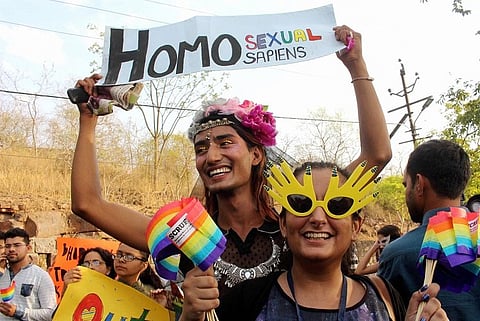

It’s 2017 but if you’re an Indian, American or a resident of 11 other countries, your country not just supports the view that homosexual relations are wrong - it finds nothing wrong with a death penalty for consenting adults in same sex relationships.
Yes, India believes there’s no reason to denounce the state killing of lesbian and gay people.
The United Nations recently tabled a resolution, ‘The question of death penalty’, to denounce the capital punishment for consensual same-sex relations. The good news, reported Tanya Mohn for Forbes, is that the resolution was passed on Friday by the 47-member UN Human Rights Council in Geneva. 27 people voted in favour of it, 13 against and 7 abstained.
Among these 13 nations were India and the United States.
The resolution was against the usage of death penalty “arbitrarily or in a discriminatory manner”, including for homosexuality. It also criticised the use of death penalty on minors, intellectually or physically disabled persons and pregnant women, and asked for acknowledgement of the racial and ethnic biases in the penalty’s application.
Introduced by Belgium, Benin, Costa Rica, France, Mexico, Moldova, Mongolia and Switzerland, the resolution called for the states which had not abolished death penalty “to ensure that it is not imposed as a sanction for specific forms of conduct such as apostasy, blasphemy, adultery and consensual same-sex relations.”
Presently, six countries criminalise same-sex relationships with death: Iran, Saudi Arabia, Sudan, Yemen, Nigeria and Somalia, reported The Independent. The number increases to eight if ISIS-occupied territories of Iraq and Syria are included.
The eight countries which introduced the vote were supported by others around the world including the UK, Congo, Kyrgyzstan and Bolivia. The 13 states to vote against the resolution were Botswana, Burundi, Egypt, Ethiopia, Bangladesh, China, India, Iraq, Japan, Qatar, Saudi Arabia, the US and the United Arab Emirates.
The Indian government’s anti-LGBTQI+ stand is not news. Back home, section 377 of the IPC, which criminalises ‘carnal intercourse against the order of nature’ - and has been used in many cases against people in consensual homosexual relationships.
The Supreme Court’s recent right to privacy judgment, where privacy was upheld as a fundamental right, has opened up new possibilities for reconsideration of section 377. However, in voting against the UN resolution, it appears that the authorities do not care about alienating sexual and gender minorities.
As Arvind Narrain writes for Scroll.in, “India’s vote on the death penalty showed a lack of support for the proposition that death penalty should not be imposed for “apostasy, adultery and consensual same sex relations”. Since the Constitutional position is that death penalty can be imposed only “in the rarest of the rare cases”, that rules out any future fanciful possibility of imposing the death penalty for “apostasy, adultery and consensual same sex relations”.”
“Such act would fall foul of the Indian Constitution as it has been interpreted by the Supreme Court. Since it is an incontrovertible position in Indian jurisprudence that Indian would not impose the death penalty for these crimes, why won’t India take a leadership role and support such propositions internationally? To state that the death penalty should not be applied on these grounds is to strongly affirm the fundamental norm of both the Indian Constitution as well as the international law – the right to life,” Narrain added.